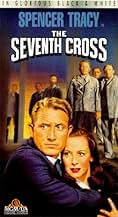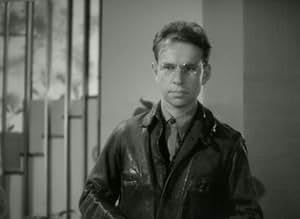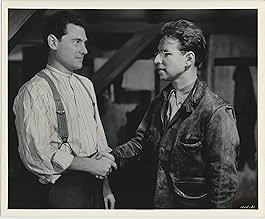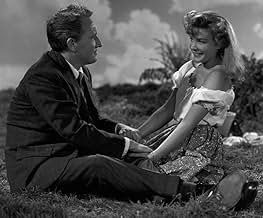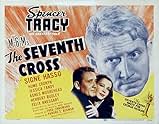IMDb RATING
7.4/10
3.2K
YOUR RATING
Seven men escape from a Nazi prison camp. One makes it to freedom.Seven men escape from a Nazi prison camp. One makes it to freedom.Seven men escape from a Nazi prison camp. One makes it to freedom.
- Nominated for 1 Oscar
- 3 wins & 1 nomination total
- Director
- Writers
- All cast & crew
- Production, box office & more at IMDbPro
Featured reviews
Although slow moving, as was typical of Hollywood dramas of that era, The Seventh Cross tells a compelling story of the human spirit overcoming the evils of totalitarianism, and the recovery of one's faith in mankind during the midst of a societal distrust. George Heisel, portrayed by Spencer Tracey (one of his classic performances), is a broken man who has lost his faith in humanity who has escaped from a Nazi concentration camp with six others in the early days of the Reich when not all Germans loved the Fuerer and still had decent intentions. The Nazi Commandant vows to capture all seven and hang them on crosses he has built inside the camp. Six are caught, but Heisel escapes to Mainz, leaving the seventh cross empty. In Mainz, he realizes that he can't go to his old girlfriend (who has married a Nazi) or his family (his younger brother has joined the SS); almost all his friends have turned Nazi or been captured or killed save one, Paul Roeder and his wife Liesel (played by longtime married actors Hume Cronyn and Jessica Tandy). The Roeder's help get him in touch with members of the underground (including Paul Guilfolye, father of the actor on CSI) who help him escape to Holland. As he leaves, he realizes he must pay back not those who hurt him and broke him, but those that healed him, those who restored his faith in the God-given decency inherent in all of us if given the chance to rise to the surface. Sometimes it can arise in the most unlikely of places, but it is there.
To be placed alongside The Hiding Place, Schindler's List and Swing Kids. A must see for anyone who loves freedom.
To be placed alongside The Hiding Place, Schindler's List and Swing Kids. A must see for anyone who loves freedom.
This film stars Spencer Tracy as a concentration camp escapee named George Heisler who navigates his way to freedom through the perils of Nazi Germany. Along the way he meets many people who help him, and his cynicism and fatigue fade away. Early in the story, soon after he's left the camp, he meets a little girl, and in his mind he's sure that he'll kill her if she attracts the wrong kind of attention to him. Next he lurches into the home of his ex-girlfriend, frightening her. And no wonder, because his face has a twisted expression on it that frightened ME - in this moment Tracy is almost unrecognizable. This man's an animal, he's been through hell and he has no reason to believe that the world is anything other than a sewer. For my money this is a pretty startling opening for a 1944 movie.
Not to throw definitions around too freely, I'm tempted to describe this film as Nazi noir. Heisler weaves his way through German society of 1936, where it's the criminals who are in power, and scuttling through the streets are the folks who are merely trying to survive, in any way possible. At the back of our minds is the worrisome knowledge that things are going to get exponentially worse. Fred Zinnemann, the director, creates an atmosphere of claustrophobia and palpable dread where the night is filled with dark shadows and any tiny act of resistance to the Nazi regime is a colossal act of courage. There is almost no violence in the film, yet the threat of violence hangs heavy in the air. Hume Cronyn and Jessica Tandy play Paul and Liesel Roeder, a couple who are old friends of Heisler and who befriend him. Paul is politically neutral. He doesn't follow the news, and one gets the feeling that he would rather not know anything about what's going on. One of the fascinating threads in the film is his growing awareness. The scenes with Cronyn and Tandy are wonderful - real chemistry is bubbling here and they seem to belong together (and we all know what happened in real life). I must mention that George Macready and Agnes Moorehead are very good in small roles. There's considerable art and intelligence in "The Seventh Cross", and a preview of what was to come in Zinnemann's illustrious career.
Not to throw definitions around too freely, I'm tempted to describe this film as Nazi noir. Heisler weaves his way through German society of 1936, where it's the criminals who are in power, and scuttling through the streets are the folks who are merely trying to survive, in any way possible. At the back of our minds is the worrisome knowledge that things are going to get exponentially worse. Fred Zinnemann, the director, creates an atmosphere of claustrophobia and palpable dread where the night is filled with dark shadows and any tiny act of resistance to the Nazi regime is a colossal act of courage. There is almost no violence in the film, yet the threat of violence hangs heavy in the air. Hume Cronyn and Jessica Tandy play Paul and Liesel Roeder, a couple who are old friends of Heisler and who befriend him. Paul is politically neutral. He doesn't follow the news, and one gets the feeling that he would rather not know anything about what's going on. One of the fascinating threads in the film is his growing awareness. The scenes with Cronyn and Tandy are wonderful - real chemistry is bubbling here and they seem to belong together (and we all know what happened in real life). I must mention that George Macready and Agnes Moorehead are very good in small roles. There's considerable art and intelligence in "The Seventh Cross", and a preview of what was to come in Zinnemann's illustrious career.
Seven prisoners escape from a German concentration camp, and the Nazi commander vows to capture and crucify all of them. One by one they are captured in some harrowing scenes and put up on the crosses outside the camp. The seventh cross, already placed, awaits the final escapee - played by a desperate Spencer Tracy. The fear and claustrophobia of being trapped, even as an escapee, inside Nazi Germany is easily seen through Tracy's able eyes. Most notable is the German couple that eventually aids Tracy despite their fear; they are played touchingly by the famous husband and wife team of Hume Cronyn and Jessica Tandy, two of the great actors of our age. Signe Hasso plays a lovely but lonely maid with whom Tracy and she have a touching emotional connection. The hope symbolized by the couple and the maid within the darkness of Nazi Germany is at the core of the film. The issue of Tracy's escape - or non-escape - is almost irrelevant by then: the glimmer of humanity is seen even among the German people. Despite the apparent pessimism of the film, it is optimistic at its heart. And it is charming and beautifully done. Not to be missed.
This one caught me by surprise. It seemed rather formulaic at first, straightforward propaganda to inspire the people back home in the last years of WWII. But as it progressed it became much more, a portrait of German society on the eve of the aggression that started it all. Some elements tended to the melodramatic, especially the romance between Tracy and Hasso. I mean come on, they're confessing their love for each other after barely spending a few minutes together? Frankly Tracy has never been a favorite of mine in his earlier roles. He always tended toward the self-righteous, the arrogant, the visionary with no human frailties.
The narration from Ray Collins, the first escapee to be caught and killed was also on the corny side. Remember he was the first to die yet he's narrating much of the story. That may have worked in 1944 but today that's pretty dated. There are more effective ways to accomplish the same thing. Moreover the pathos in his voice was also a little over the top.
The standout performances here were from Hume Cronyn and Jessica Tandy as a couple from the working class who are enjoying the benefits of National Socialist largess. Their situation perfectly illustrated how the Nazi social programs kept the German workers happy with subsidies and tax advantages. I'm impressed that a film from 1944 dealt with that in an honest and straightforward manner. In my opinion the standout scene is when the Cronyn returns home after being questioned by the Gestapo and finds Tandy sitting at the table in their apartment. She looks up at him and the look on her face goes from surprise to amazement to joy and then she releases all her pent-up emotions and breaks down in uncontrollable sobs as Cronyn tries to comfort her. What a moving moment and what a treat!
The narration from Ray Collins, the first escapee to be caught and killed was also on the corny side. Remember he was the first to die yet he's narrating much of the story. That may have worked in 1944 but today that's pretty dated. There are more effective ways to accomplish the same thing. Moreover the pathos in his voice was also a little over the top.
The standout performances here were from Hume Cronyn and Jessica Tandy as a couple from the working class who are enjoying the benefits of National Socialist largess. Their situation perfectly illustrated how the Nazi social programs kept the German workers happy with subsidies and tax advantages. I'm impressed that a film from 1944 dealt with that in an honest and straightforward manner. In my opinion the standout scene is when the Cronyn returns home after being questioned by the Gestapo and finds Tandy sitting at the table in their apartment. She looks up at him and the look on her face goes from surprise to amazement to joy and then she releases all her pent-up emotions and breaks down in uncontrollable sobs as Cronyn tries to comfort her. What a moving moment and what a treat!
I saw this movie for the first time at the tender age of 10; at the time I obsessed over the concept of WW2 and the reasons behind it. Even at 10, I understood the impact that this movie must have had on so many people around the world. The movie was actually banned in Germany because of its terrifying portrayal of the Nazis and their regime. With its controversial content, one might wonder why the movie was even made to begin with. As an adult, I appreciate this movie so much more than I did when I was young, mostly for its honesty and its hopeful message.
Even though the movie contains a lot of violence and graphic depictions (at least from a 1940's perspective), I think the movie is fine for children to watch. In fact, the events in the movie are quite accurate; therefore, the movie might be a nice history lesson.
Watch and you'll see! The seventh cross will hold a place in your heart for years to come.
Even though the movie contains a lot of violence and graphic depictions (at least from a 1940's perspective), I think the movie is fine for children to watch. In fact, the events in the movie are quite accurate; therefore, the movie might be a nice history lesson.
Watch and you'll see! The seventh cross will hold a place in your heart for years to come.
Did you know
- TriviaFirst joint film appearance of real life couple Hume Cronyn and Jessica Tandy.
- GoofsWhen the escapees are being hunted, the only uniformed personnel we see chasing them are the 'Storm troopers' (Sturmabteilung) or SA. Even before the 'night of the Long Knives', the SA would not have been the only group to search for escapees & by 1936, the hunt would also have been carried out by the regular police and the Schutzstaffel (SS).
- Quotes
George Heisler: There are no better men than Paul Roeder.
- Alternate versionsThere is an Italian edition of this film on DVD, distributed by DNA srl, "LA SETTIMA CROCE (1944) + THE SEARCH (Odissea tragica, 1948)" (2 Films on a single DVD), re-edited with the contribution of film historian Riccardo Cusin. This version is also available for streaming on some platforms.
- ConnectionsFeatured in Twenty Years After (1944)
- How long is The Seventh Cross?Powered by Alexa
Details
- Release date
- Country of origin
- Languages
- Also known as
- La séptima cruz
- Filming locations
- Riverside, California, USA(orchard)
- Production company
- See more company credits at IMDbPro
Box office
- Budget
- $1,300,000 (estimated)
- Runtime
- 1h 52m(112 min)
- Color
- Aspect ratio
- 1.37 : 1
Contribute to this page
Suggest an edit or add missing content


